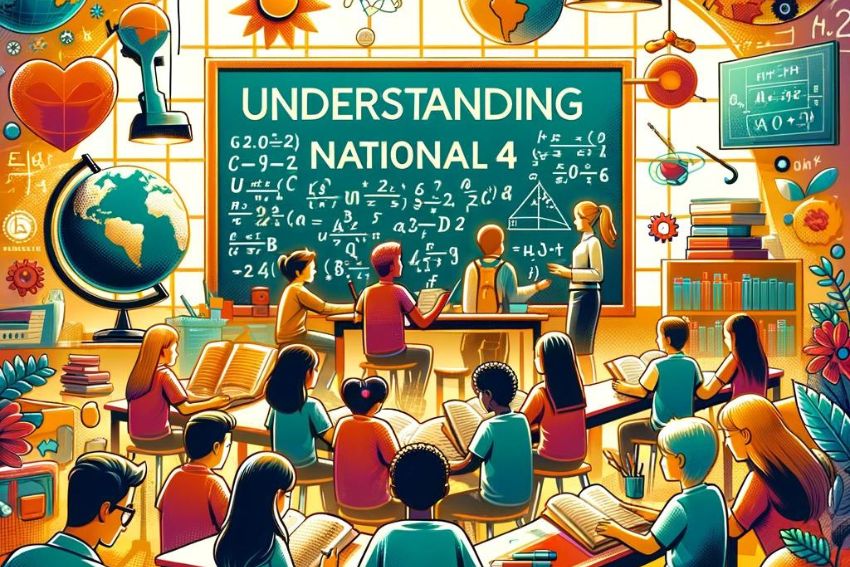If you’ve ever wondered what National 4 is or how it fits into the Scottish education system, you’re in the right place. Often seen as the Scottish equivalent of GCSE, National 4 is a key qualification designed for students aged 14 to 16.
It forms an essential part of Scotland’s secondary education pathway, giving learners the knowledge, skills and confidence they need to progress. In this guide, we’ll explain everything you need to know about the National 4 qualification, from its structure and grading system to how it opens doors to further study.
What is National 4?
National 4 is a qualification within the Scottish Credit and Qualifications Framework (SCQF) at Level 4, forming an important part of secondary education in Scotland. It’s designed to give students a solid general education while developing the skills needed for future study or employment.
Often viewed as the Scottish equivalent of GCSE at a lower-tier level, National 4 focuses on continuous assessment rather than final exams. It provides a supportive and flexible learning experience for students who prefer practical coursework and steady progress throughout the school year.
The main goal of National 4 Scotland is to help learners build confidence, strengthen core academic abilities and prepare for progression to National 5 or vocational qualifications, setting a strong foundation for success in both education and work.

The Structure of National 4 Courses
The National 4 courses mainly structure their content around three or four units. Furthermore, these units integrate different aspects of the subject area. Consequently, they aim to help pupils grasp the subject matter thoroughly, allowing them to develop an excellent all-round skill set in their studies.
In Nat 4, the higher qualifications do not have final exams; continuous assessments are present throughout the course. At the end of it all, the teachers mark the assessments, and the Scottish Qualifications Authority (SQA) further scrutinises the marks to ensure standards are maintained.
Nat 4 Grading System
The grading system is pass-or-fail and does not use traditional letter grades or percentages. Moreover, learners must pass all mandatory units and complete a value-added unit, which includes a project or assignment, to be eligible for the “Pass” certificate status.
Subjects List in National 4
National 4 offers a wide array of subjects, designed to cater to the diversity of learners’ interests and ambitions in the future job world. For instance, core subjects include English, Mathematics, and Sciences. Additionally, Social Studies, Technologies, and Expressive Arts are also part of the curriculum
Progression Opportunities After National 4
Curriculum for Excellence is Scotland’s national curriculum and includes National 4. Moreover, it is created to make a flexible, coherent, and all-encompassing framework for ages 3 to 18. Consequently, it develops skills for learning, life, and work to ensure the children are well-prepared for their future.
National 4 is a stepping stone to further qualifications, especially National 5. Attainment at the National 4 level will allow for progression to the National five courses, which are of a higher level and are, in fact, externally assessed. National Four can also serve as a ‘feeder’ towards more practical courses or employment at a more fundamental level by gaining practical skills and experience.
Benefits of National 4 Education
National 4 gives the students a general and overall learning experience. It introduces them to a broad diversity of topics and skills that the student can use for their growth and success within their learning experience.
This consistent assessment model for National 4 has a robust set of added-value features that consider the diverse learning needs and styles of the candidates, hence giving them the ability to show their worth when under the pressure of examination.
Learner Pathways Flexibility
The purpose of National 4 is to develop several options. With these options, students can progress quickly from National 4 to either higher education, vocational education, or move directly into employment.
Be able to know deadlines and manage how your time will be shared to ensure completing coursework and assessment activities. Seek the guidance of a teacher about anything you do not understand or find difficult.
Regular practicing and revising can help a learner consolidate learning and increase assessment performance. Take an interest in the classroom discussions and activities, and this will give students a better understanding of the subjects.
GCSE vs National 4 – Differences
When evaluated against Scotland’s National 4 qualifications, it is abundantly crucial to understand the differences but also the similarities that are present between the two processes. The GCSE within the United Kingdom is an essential type of examination that most students take between the ages of 14 and 16, covering numerous subjects from mathematics and sciences to humanities and the arts. The GCSE grading scale is from 9 (highest) to 1 (lowest).
National 4 is within the Scottish Credit and Qualifications Framework and is done by mainly S3 and S4 level students, equating to Year 10 and Year 11 in England. Purely coursework and in-school achievement unit assessments form the method for internally assessing these, no final exam structure exists. This is graded on a pass-and-fail basis.
GCSE Vs National 4 Comparison
| Aspect | National 4 | GCSE |
|---|---|---|
| Qualification Level | Broadly equivalent to GCSE grades 3-1 | Broadly equivalent to National 4 and 5 combined |
| Typical Age | 14-16 years old | 14-16 years old |
| Assessment Method | Internally assessed with continuous assessment throughout the year | Combination of coursework and final exams |
| Grading | Pass/Fail (No final exams) | Graded 9-1 (9 being the highest, 1 the lowest) |
| Further Education Progression | Progression to National 5 or vocational qualifications | Progression to A-Levels, vocational qualifications, or apprenticeships |
The main differences between these qualifications come from their assessment methods and grading systems. While GCSEs are a mixture of coursework and terminal examinations, there is not one terminal exam on a National 4, for it is coursework through and through. Both offer similar core subjects, however, including English, Maths, and Science, and both are of exceptionally high educational standards and which prepare an individual for further levels of education and the push and pull of the competitive work environment.
The only difference between the GCSE and National 4 is arguably based on the region more than a factual statement, as they are both highly respected and liked courses offering a brutally sharp and equally matched playing field for further education and employment.
Conclusion
National four qualifications form an integral part of Scottish education, which offers students balanced and inclusive educational services. Understanding its framework, modes of assessment and progression opportunities is important for students and their parents. Whether in the higher grades or at work, National 4 is your way up the qualification ladder.
Behind this journey are high-quality online National 4 tutors, who make sure that the students under them excel through and through. With Edumentors, a student can be assured that they will reach the goal that they have in their mind and open up a golden chapter for the future.
FAQs
What is a Nat 4 equivalent to?
National 4 is often considered the Scottish equivalent of GCSE at a lower tier. It’s part of the Scottish Credit and Qualifications Framework (SCQF Level 4) and sits just below National 5, which aligns more closely with the mid-to-higher GCSE grades in England. Both qualifications serve a similar purpose: to prepare students for further education, apprenticeships, or employment.
What are level 4 qualifications?
Level 4 qualifications usually include higher national certificates (HNCs), advanced apprenticeships and some professional diplomas. In the Scottish system, Level 4 aligns with National 4 qualifications on the SCQF aimed at students in early secondary education, around ages 14-16. They demonstrate practical skills, subject knowledge, and readiness for further study or work.
What is an NQF 4 qualification?
An NQF Level 4 qualification refers to a qualification level within the National Qualifications Framework, commonly used in England, Wales and Northern Ireland. It’s roughly comparable to the SCQF Level 7 in Scotland, meaning it’s a higher-level qualification than National 4, typically aligned with certificate or diploma-level studies beyond secondary school.
Is Nat 4 good?
Yes, National 4 is a valuable qualification within Scotland’s education system. It provides students with a solid foundation in key subjects, helping them develop essential academic and practical skills. It’s ideal for learners who prefer continuous assessment rather than formal exams and acts as a stepping stone towards National 5 or vocational training.








